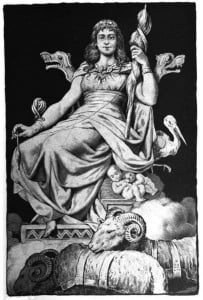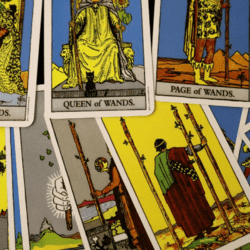 Consider for a moment that your husband is gone for extended periods of time. Add to that consideration the fact that he has, and will have additional, children with other women. He is also a war chieftain, traveler, and responsible for overseeing an entire land. That would be hard to contend with for most wives. Now, let’s add a few more details to our consideration. Your husband is exiled from home for a period lasting up to a decade, and you will not be going with him. There won’t be any simple means of reaching him to ask a question, or just to sit and have a meal together. Imagine the amount of patience, open-mindedness, and understanding that it would take to form a home with your husband knowing all of these things and still succeed at keeping your sanity and happiness. To say that would be tough would be an understatement!
Consider for a moment that your husband is gone for extended periods of time. Add to that consideration the fact that he has, and will have additional, children with other women. He is also a war chieftain, traveler, and responsible for overseeing an entire land. That would be hard to contend with for most wives. Now, let’s add a few more details to our consideration. Your husband is exiled from home for a period lasting up to a decade, and you will not be going with him. There won’t be any simple means of reaching him to ask a question, or just to sit and have a meal together. Imagine the amount of patience, open-mindedness, and understanding that it would take to form a home with your husband knowing all of these things and still succeed at keeping your sanity and happiness. To say that would be tough would be an understatement!
But that is exactly what the Eddas tell us about Frigg. From the Eddas, we know that Odin is gone – a lot. It is also theorized that Odin may be Odr, the husband of Freya (who may, or may not be, a personification of Frigg). If Freya and Frigg are indeed two separate entities, then there is an additional piece to consider in an already big equation. So how does Frigg do it? That may be a question for her to answer, one day, if I’m able to ask. For now, here is my humble speculation.
In the story of Saga, who many scholars agree is Frigg, Odin sits with her and trades stories while drinking mead. He confides in her. It is obvious that he trusts her and he always returns home, even after being in exile for an extended period of time. There is more than just a marital bond between them; they are also friends, and as Saga, it’s suggested that she is a source of inspiration. Odin’s absences and subsequent returns are not the same as the way that a married man strays from his wife and home, only to return begging forgiveness later. In Norse mythology, it is common for the gods to have multiple spouses and children by various partners. Those children are raised as part of a community, and unless it’s written in a lost part of the lore that we don’t know about, it is not frowned upon. Loki mentions these relations in the Lokasenna and notes that Frigg keeps intimate company with Odin’s brothers, Vili and Ve, while he is away.
It is also said that Frigg knows all, yet remains silent. She would certainly know, or be at least keenly aware, of her husband’s whereabouts and relationships, should she choose to focus on that. Perhaps she does take lovers into her bed, but outside of Loki’s accusation it is never explored, and certainly not something that I am qualified to attempt to answer. What we see here is a different way of life than most of us are accustomed to, which seems to work out for the gods that we hold sacred. It’s worth considering when we examine the woman that Frigg is, for she is a goddess of understanding.
Frigg does not sit alone in her home in Fensalir, waiting for Odin to return at will and moping about in the meantime. She maintains her responsibilities, cares for her family, and responds to her own duties. The handmaidens of Frigg are nurturing, protective, and guiding of home and hearth. Whether her handmaidens are independent goddesses or aspects of Frigg, we can see that her role as matron and protectorate of household affairs is at the center of her responsibilities and that they are taken quite seriously. I can only imagine how many women have called out to her for inner peace while taking care of a rowdy or ill child. I can almost hear the Norse women of ancient times seeking her peace and guidance, for many of those women were always unsure of whether their own husbands would return from a voyage at sea. How unsettling it would be to be alone in a time when you had small children to care for, and finding that you are now also left to fend for your family’s daily needs in addition to that. Single mothers still do it to this day, and Frigg hears their calls as well.
Looking at Frigg in this way helps us to view her divine nature, along with her very human side of being the protective mother and peacekeeper of the home. We sometimes forget that she has dealt herself with so many of the circumstances that ordinary women face every day. She understands these calls, but you never hear of her sitting down and quitting. She gets up each day and is stronger for it. No one ever considers her in the Eddas as a victim of circumstance, but rather the impression of her is one of strength, perseverance, and dignity. Life, even for the gods, isn’t packaged in a neat little box with a big bow on top. Life does not work within defined parameters. We learn from Frigg that there is strength in maintaining our home, caring for loved ones, and building our lives in a way that reflects dignity and honor. In fact, when Frigg addresses Loki’s gibe about her relationship with Odin’s brothers, it is almost a humorous response, not an offended one. She answers his statement and moves on. Frigg is already well aware of her life, and pointing out a few details about it does not bother her. Her life, and her responsibilities, go on regardless.
A valuable lesson comes from looking at Frigg, for she knows the hearts and minds of women quite well. From her, we take note that we can, and do, go on. We approach life with that same determined perseverance, and a healthy dose of open-mindedness, to handle the wacky tricks that are tossed into our lives by circumstance. But we’re able to call on her if we need to, knowing that she can relate and understand.
Heathen Woman is published on alternate Fridays. Subscribe via RSS or e-mail!













